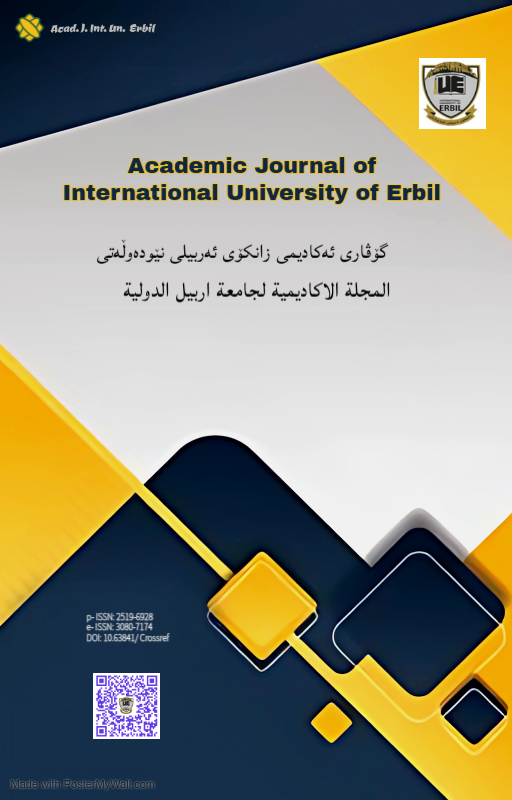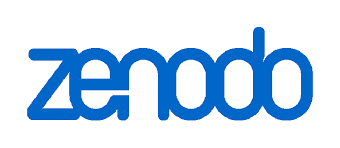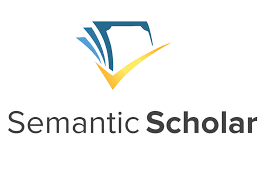The Contribution of Knowledge Orchestration to Strategic Excellence: An Analytical Perspective from Leaders in Private Hospitals in Erbil
Contribution of Knowledge Orchestration to Strategic Excellence
DOI:
https://doi.org/10.63841/23546Keywords:
Knowledge Orchestration, Strategic Excellence, Knowledge Management, Strategic Management.Abstract
This study intends to contribute to knowledge orchestration to strategic excellence. Based on the research objectives, the research problem was clearly articulated as a series of questions: Is there a statistically significant relationship between Knowledge Orchestration and Strategic Excellence in Private Hospitals in Erbil? This study aims to examine the relationship and influence of Knowledge Orchestration on Strategic Excellence.
Researchers utilize analytical descriptive approaches. This study investigates primary hypotheses while analyzing the interrelationships and impacts of research variables. The research sample consists of a cohort of leaders from selected private hospitals in Erbil City. There were 88 leaders from a sample of private hospitals in Erbil City. The research distributed 88 questionnaires as a representative sample. 83 questionnaires were gathered, all considered suitable for statistical analysis. The hypotheses were statistically analyzed using SPSS Version 26.
The study produced several conclusions, one of which is that delegating authority and involving staff in decision-making processes enhances the attainment of strategic excellence. Moreover, A positive correlation exists between Knowledge Orchestration and Strategic Excellence. The study provided a series of recommendations, one of which was the imperative of establishing a unified organizational culture to execute knowledge integration methods and cultivate a diversified knowledge repository. Furthermore, the integration of knowledge management activities with quality management frameworks can enhance performance excellence in healthcare.
Downloads
References
R. Y. Salman, & N. J. Mohammed, “The Effect of Knowledge Orchestration on Dynamic Capabilities: An Analytical Research in the Iraqi Media Network,” Journal of Economics and Administrative Sciences, vol.30, no.141, pp.83-103, 2024.
P. Hurmelinna-Laukkanen, & S. Nätti, “Orchestrator Types, Roles and Capabilities–A Framework for Innovation Networks,” Industrial Marketing Management, vol.74, pp. 65-78, 2018.
R. Paavo, D. K. Charlotte and G. Benoit, “Orchestrating Knowledge Networks: Alter-Oriented Brokering,” Journal of Management, vol.49, no.3, pp. 1–39, 2022.
H. O. Mohammed, “The Mediating Role of Organizational Culture in the Relationship Between Leadership Styles and Employee Engagement: An Analytical Study of Kurdistan Manufacturing Companies,” Qalaai Zanist Scientific Journal, vol.9, no.2, pp. 13-14, 2024.
S. J. Al-Husseini, & T. A. Dosa, “The influence of transformational leadership on knowledge sharing in Iraq's public and private higher education: A comparison study.,” International Journal of Educational and Pedagogical Sciences, vol.11, no.1, pp. 100–106, 2017.
S. L. Ratnasari, S. Gunawan, & E. M. Sutanto, “The role of knowledge management in organizational strategic vision integration.,” Journal of Knowledge Management, vol.27, no.2, pp. 345–360, 2023.
M. Karamat, & Y. K. Tong, "Barriers to knowledge management in the health sector of Pakistan," Journal of Research in Social Sciences, vol.7, no.2, pp. 15–28, 2019.
S. I. Khan, “Transactional, transformational and Laissez-Faire leadership styles: A meta-analysis comparing women and men,” The Journal of High Technology Management Research, vol.35, no.2, pp. 100502, 2024.
Y. Nimri, “The Role of Orchestra in the Enrichment of Music in Jordan,” The Jordanian Journal of Arts, vol.11, no. 2, pp. 83-95, 2018.
M. H. Ali and R. H. Mahmood, “The Effects of Organizational Health on the Knowledge Sharing,” Qalaai Zanist Scientific Journal, vol.7, no.4, pp. 812-845, 2022.
S. Sajadirad, “Knowledge Orchestration Within A Distributed Operations Network.,” Ph.D. thesis, Aalborg University, Denmark., 2017.
A. A. Abdulhameed, & S. A.-D. Al-Kubaisy, “The Effect of Knowledge Upgrading on Business Continuity: A Field Research in Private Colleges and Universities in Baghdad,” Journal of Economics and Administrative Sciences, vol. 29, no. 136, pp. 1-15, 2023.
J. G. Cegarra-Navarro, F. J. A. Ruiz, E. Martínez-Caro, & A. Garcia-Perez, “Turning Heterogeneity Into Improved Research Outputs In International Rand Teams,” Journal Of Business Research, vol. 128, pp. 770-778, 2019.
A. A. Mohammed, A. Hafeez-Baig, & R. Gururajan, “Designing a knowledge management measurement for educational institutions: A qualitative research,” International Journal of Information Systems and Change Management, vol.11, no.2, pp. 157-187, 2019.
A. A. Mohammed, “Assessing the Success of the Perceived Usefulness for Knowledge Management Systems: A Case Study of Iraqi Higher Education,” International Journal of Knowledge Management, vol.18, no.1, pp. 1-24, 2022.
A. A. Mohammed, R. Gururajan, &A. Hafeez-Baig, “Primarily investigating into the relationship between talent management and knowledge management in business environment,” In Proceedings of the International Conference on Web Intelligence, pp. 1131-1137, 2017.
Y.-M. Felker, “Organizational Learning, Knowledge Orchestration, and CEO Personality – An Integrative Coordination Perspective on Value Creation in Acquisitions,” Department of Entrepreneurship and Strategy, Ph.D. thesis, Lancaster University, 2022.
A. Shirish, S. C. Srivastava, N. Panteli, & J. O’Shanahan, “A knowledge-centric model for government-orchestrated digital transformation among the microbusiness sector,” Journal of Strategic Information Systems, vol. 34, no. 1, pp. 1-30, 2025.
S. Koentjoro, & A. Eliyana, “Resource Orchestration: Consolidation, Integration, Entrepreneurial and Affective Commitment in Creating Sustainable Competitive Advantage in the Family Firm,” International Journal of Business and Social Science, vol.6, no.3, pp. 128-140, 2015.
J. Liu, “Knowledge Orchestration And Digital Innovation Networks: Insights From The Chinese Context,” Ph.D. thesis, University Of Warwick, England, 2017.
J. R. Malin, C. Brown, & A. S. Trubceac, "Going for broke: A multiple-case study of brokerage in education," AERA Open, vol. 4, no. 2, pp. 1–14, 2018.
A. A. Rad, P. Flocchini, & J. Gaudet, “Computation and analysis of temporal betweenness in a knowledge mobilization network,” Computational social networks, vol.4, no.1, pp. 1-15, 2017.
C.W. Yang, “Orchestrating knowledge-creating networks: lessons from Taiwan’s health services sector,” Technology Analysis & Strategic Management, vol.28, no.6, pp. 703–716, 2016.
N. D. Oye, M. Salleh, & A. Noorminshah, “Knowledge sharing in workplace: Motivators and demotivators,” International Journal of Managing Information Technology, vol.3, no.4, pp.71-84, 2011.
K. Muiruri, “Relationship between Knowledge Management and Organizational Performance: A Case Study of United States International University – Africa,” MBA thesis, United States International University – Africa, 2016.
R. K. Yeo, & M. J. Marquardt, “To Share Or Not To Share? Self-Perception And Knowledge-Sharing Intent,” Knowledge Management Research and Practice, vol.13, no.3, pp. 311-328, 2015.
D. Fam, R. Duncan and M. Robson-Williams, “Knowledge Integration Verses Knowledge Interaction, Conference: International Transdisciplinary Conference, Joining forces for change At: Chalmers University, Goteborg, Sweden.,” 2019.
Y. Nie, Y. Xiao, J. C. Fritchman, Q. Liu, J. Han, J. Xiong, & L. Bao, “Teaching towards knowledge integration in learning force and motion,” International Journal of Science Education, vol.41, no.16, pp. 2271-2295, 2019.
S. B. Ammar, H. Mosbahi, & T. Aissaoui, “Smart Supply Chain: A Lever for Strategic Excellence,” In proceeding of International Conference on Control, Automation and Diagnosis (ICCAD), Paris, France, 2024.
M. H. Ali, & R. H. Mahmood, "Analyzing the Influencing Relationship between Strategic Awareness and Organizational Prosperity through Human Talent Management,” Qalaai Zanist Scientific Journal, vol.8, no.3, pp. 836–866, 2023.
A. M. AL-Hmoud, & K. AL-ghoul, “The degree of implementation of governance and its relationship to organizational excellence in private Jordanian universities in the capital governorate “Amman”, from the viewpoint of teaching staff.,” Journal of the Association of Arab Universities for Research in Higher Education, vol.42, no.2., pp. 28-56, 2021.
S. H. Ammari, “The degree of school principals’ practice of distributive leadership and its relationship to achieving organizational excellence: An applied study in public secondary schools in the capital Amman governorate,” Journal of Educational and Psychological Sciences, vol.6, no.16, pp. 47-70, 2022.
Gerhard and Joshua, Strategic Excellence in the Architecture, Engineering, and Construction Industries: How AEC Firms Can Develop and Execute Strategy Using Lean Six Sigma, CRC Press, 2018.
G. Plenert and J. Plenert, Strategic Excellence in the Architecture, Engineering, and Construction Industries: How AEC Firms Can Develop and Execute Strategy Using Lean Six Sigma., Productivity Press, 2018.
E. Vatamanescu, C. B. Madalina, D. Dan-Cristian, & P. Simona, “Capitalizing Online Knowledge Networks: From Individual Knowledge Acquisition Towards Organizational Achievements,” Journal of Knowledge Management, vol. 27, no. 4, pp.1366-1389, 2022.
K. M. T. Banyhamdan, N. M. Aljawarneh, M. A. Alomari, M. S. Almasarweh, I. M. Harafsheh, & A. A. AlwagfI, “Impact of human capital in quality and strategic excellences," International Journal of Advanced Science and Technology, vol.29, no.7, pp. 11701-11719, 2020.
L. M. M. Al somaidaee, & G. D. Al-zubaidi, “Moderating Role of Virtual Teams on the Relation between Cultural Intelligence and Strategic Excellence,” Revista Geintec-Gestao Inovacao E Tecnologias, vol.11, no.4, pp. 3703-3716, 2021.
N. J. HADAAD, P. AL-SHURMAN, & M. Mohmoud, “The degree of organizational excellence of the primary schools in the North Area within the Green Line from teachers' point of view,” Jordanian Educational Journal, vol.7, no.2, pp. 1-29, 2022.
S. Lubda, & S. Alsaeed, “Examining the mediating effect of strategic agility in the relationship between organizational learning mechanisms and organizational excellence: The case of Kafrelsheikh University’s employees,” Scientific Journal of Financial and Commercial Studies and Research, vol.3, no.1, pp. 285-314, 2022.
N. N. Basheer, & M. O. Hassan, “The role of organizational integrity in enhancing strategic excellence,” Iraqi Journal for Administrative Sciences, vol. 20, no. 80, pp. 79-103, 2024.
J. M. Kouzes, & B. Z. Posner, The Leadership Challenge: How to Make Extraordinary Things Happen in Organizations (J-B Leadership Challenge: Kouzes/Posner) 7th edition, Jossey-Bass, 2023.
M. BANSAL, & S. KAPUR, “Life skills from Bhagavad Gita: A vital enabler for leadership excellence in pandemic times and the world beyond,” International Journal of Management Concepts and Philosophy, vol.15, no.1, pp. 79-90, 2022.
M. M. Al- Faris, & M. H. H. B. Khaled, “Impact of Digital Leadership on Kuwaiti Hospitals’ Employees’ Performance,” Journal of Economic, Administrative and Legal Sciences, vol.6, no.19, pp.132-142, 2022.
M. F. A. Al-Aqla, “The Impact of Leadership on Organizational Development in the Private Sector: An Applied Study on SADAFCO Food and Dairy Company in the Kingdom of Saudi Arabia.,” Scientific Journal of Economics and Trade, vol.49, no.1, pp. 5-70, 2019.
K. Alrawashdeh, & F. Altaany, “The role of Knowledge management requirement on organizations' excellence: (A field of study in Jordan; Aqaba Special Authority Zone),” International Journal of Applied Engineering Research, vol.14, no.1, pp.86-99, 2017.
R. M. Al-Khawli, “The Concept of Organizational Culture: A Theoretical and Applied Review’, International Journal of Public Policy in Egypt,” Information and Decision Support Center of the Cabinet, vol.1, no.1, pp.50-72, 2022.
S. I. Khalil, O. M. Farhan, & H. A. Hamad, “The Role of Digital Leadership in Achieving Organizational Excellence: An Applied Study at the University of Tikrit,” World Economics and Finance Bulletin, vol.12, pp.85-94, 2022.
N. Al-Aqraa, “The Impact of Organizational Culture on the Development of Governmental Institutions in Qalqilya Governorate,” Journal of Economic, Administrative and Legal Sciences, vol.6, no.21, pp.95-118, 2022.
J. Wirtz, & T. Menkhoff, “National Library Board Singapore: Delivering cost-effective service excellence through innovation and people,” In: World Scientific Book Chapters, 2021.
A. Fradi, & E. Manzari, “Customer Service Excellence Strategy and Methods of Retaining and Developing Customers,” The First International Conference on Marketing, University of Setif, Algeria, 2018.
M. Hartono, A. Santoso, & D. N. Prayogo, “Ergonomics-based Kansei Engineering and Kano Model for Public Services Excellence,” In Proceedings of the International Conference on Industrial Engineering and Operations Management, Bandung, Indonesia, March (No. ID 162), 2018.
A. Ghasemi, & M. Nadiri, “Performance assessment of Iranian petrochemical companies using sustainable excellence model,” Safety Science, vol.87, pp.280-291 89, 2016.
K. S. Taber, “The use of Cronbach’s alpha when developing and reporting research instruments in science education,” Research in Science Education, vol.48, no.6, pp. 1273–1296, 2018.
H. T. A. Blbas, & W. T. Kahwachi, “A comparison between new modification of adaptive Nadaraya-Watson kernel and classical adaptive Nadaraya-Watson kernel methods in nonparametric regression: A simulation study,” Cihan University-Erbil Scientific Journal, vol.5, no.2, pp.32-37, 2021.
Downloads
Published
Issue
Section
License
Copyright (c) 2025 Academic Journal of International University of Erbil

This work is licensed under a Creative Commons Attribution-NonCommercial-NoDerivatives 4.0 International License.












